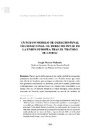Identificador persistente para citar o vincular este elemento:
https://accedacris.ulpgc.es/jspui/handle/10553/57177
| Campo DC | Valor | idioma |
|---|---|---|
| dc.contributor.author | Romeo Malanda, Sergio | en_US |
| dc.date.accessioned | 2019-10-18T15:43:07Z | - |
| dc.date.available | 2019-10-18T15:43:07Z | - |
| dc.date.issued | 2012 | en_US |
| dc.identifier.issn | 1137-7550 | en_US |
| dc.identifier.other | Dialnet | |
| dc.identifier.uri | https://accedacris.ulpgc.es/handle/10553/57177 | - |
| dc.description.abstract | Puesto que la delincuencia se ha vuelto global, las respuestas puramente nacionales son insuficientes. Los Estados tienen que mirar más allá de las fronteras para proteger su soberanía. En el pasado, estos han guardado celosamente su territorio, pero en el mundo globalizado contemporáneo, este enfoque hace a los estados más vulnerables, y no menos. Por eso, el Derecho Penal de la Unión Europea, como modelo avanzado de Derecho penal transnacional, es uno de los ámbitos de más rápido crecimiento de la legislación de la UE. También es uno de los ámbitos más controvertidos de la acción de la UE, pues comprende instrumentos que tienen un impacto significativo en la protección de los derechos fundamentales, pero al mismo tiempo pone en cuestión la soberanía de los Estados. Este artículo tiene como objetivo proporcionar una visión general de los principios generales del Derecho penal sustantivo en la UE tras la entrada en vigor del Tratado de Lisboa. | en_US |
| dc.description.abstract | Since crime has gone global, purely national responses are inadequate. States have to look beyond borders to protect their sovereignty. In the past, they have jealously guarded their territory, but in the contemporary globalized world, this approach makes states more, rather than less vulnerable. That is why EU Criminal Law, as an advanced model of Transnational Criminal Law, is one of the fastest-growing area of EU law. It is also one of the most contested fields of EU action, covering measures which have a significant impact on the protection of fundamental rights, while at the same time presenting a challenge to State sovereignty. This article aims to provide an overview of the general principles of substantive EU criminal law under the Lisbon Treaty. | en_US |
| dc.language | spa | en_US |
| dc.relation.ispartof | Estudios penales y criminológicos | en_US |
| dc.source | Estudios penales y criminológicos [ISSN 1137-7550], n. 32, p. 313-386 | en_US |
| dc.subject | 560505 Derecho penal | en_US |
| dc.subject.other | Derecho penal transnacional | en_US |
| dc.subject.other | Derecho penal europeo | en_US |
| dc.subject.other | Globalización | en_US |
| dc.subject.other | Principio de legalidad | en_US |
| dc.subject.other | Tratado de Lisboa | en_US |
| dc.subject.other | Transnacional Criminal Law | en_US |
| dc.subject.other | EU Criminal Law | en_US |
| dc.subject.other | Globalization | en_US |
| dc.subject.other | Legality Principle | en_US |
| dc.subject.other | Lisbon Treaty | en_US |
| dc.title | Un nuevo modelo de derecho penal transnacional: el derecho penal de la Unión Europea tras el Tratado de Lisboa | en_US |
| dc.type | info:eu-repo/semantics/article | en_US |
| dc.type | Article | en_US |
| dc.identifier.url | http://dialnet.unirioja.es/servlet/articulo?codigo=4129480 | - |
| dc.description.lastpage | 386 | - |
| dc.identifier.issue | 32 | - |
| dc.description.firstpage | 313 | - |
| dc.investigacion | Ciencias Sociales y Jurídicas | en_US |
| dc.type2 | Artículo | en_US |
| dc.contributor.authordialnetid | 74150 | - |
| dc.identifier.dialnet | 4129480ARTREV | - |
| dc.identifier.ulpgc | Sí | es |
| dc.description.erihplus | ERIH PLUS | |
| item.fulltext | Con texto completo | - |
| item.grantfulltext | open | - |
| crisitem.author.dept | GIR IUIBS: Medio Ambiente y Salud | - |
| crisitem.author.dept | IU de Investigaciones Biomédicas y Sanitarias | - |
| crisitem.author.dept | Departamento de Derecho Público | - |
| crisitem.author.orcid | 0000-0002-9414-451X | - |
| crisitem.author.parentorg | IU de Investigaciones Biomédicas y Sanitarias | - |
| crisitem.author.fullName | Romeo Malanda, Sergio | - |
| Colección: | Artículos | |
Visitas
185
actualizado el 15-ene-2026
Descargas
63
actualizado el 15-ene-2026
Google ScholarTM
Verifica
Comparte
Exporta metadatos
Los elementos en ULPGC accedaCRIS están protegidos por derechos de autor con todos los derechos reservados, a menos que se indique lo contrario.
